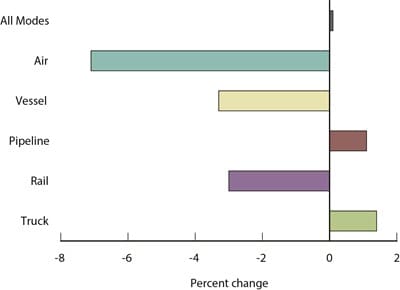
Nine years ago, almost to the day, I was in my third week of employment at ARC Advisory Group. Steve Banker had a meeting scheduled with a small logistics software company. I could see the hesitancy in Steve’s eyes- inviting me to attend the meeting was the collegial thing to do, but having such a green employee in attendance opened up the possibility for numerous missteps. That was the first meeting I attended as an ARC employee. BlueSky Logistics was the name of the company providing the briefing. I hadn’t thought about that meeting until yesterday when I read a press release stating that Wynright Corporation had acquired the rights to BlueSky’s business intelligence solution. Nine years – a lot has happened in the supply chain industry since then.
Now on to this weeks news….
- Nafta Trade Rises 0.1% in November
- Vessels backing up at an alarming rate on the West Coast
- IBM wants to protect our food by sequencing its supply chains
- E-Commerce Driving 51 Percent Increase of New Logistics Space in Asia in 2015
- Greece may freeze privatization plans for rails, airport and Thessaloniki port
NAFTA Trade increased only 0.1 percent in November, according to the Department of Transportation. I found this anemic growth rate to be a bit surprising, so I looked more closely at the details including import/export, Canada and Mexico, mode, and type of cargo. As the attached graphic shows, pipeline and truck were the only modes to increase. Initially I thought that the abrupt drop in oil prices was the primary reason for the decline (the trade is measured in value, as opposed to volume). And the press release does mention lower mineral fuel prices as a driver. However, there was an increase in pipeline trade, so there are clearly other factors at play. I believe the decrease in vessel is a result of both lower oil prices and west coast port congestion (see Vessels backing up at an alarming rate on the West Coast). In fact, the Cass|INTTRA Ocean Freight Index shows that ocean container imports surged 32 percent in December, while exports also increased by almost 20 percent. This dramatic increase leads me to believe that the vessel decline in November is only temporary, and related to oil price and congestion factors. At the same time, the slower growth in NAFTA trade was also attributed to lower rail imports of vehicles, parts, and machinery and lower airline trade of precious stones and aircraft and machinery components. All in all, I believe November is just an anomaly, but I will keep my eyes out for potential signs of a macroeconomic slowdown.
The congestion at the west coast ports in not a new story. But the lack of progress certain is notable. The JOC article points out that on Wednesday that the number of container ships anchored and awaiting berth included 17 at LA-Longbeach, 5 at Oakland, and 6 at Tacoma. Alphaliner called this the “worst-ever case of U.S. port congestion on record.” Maybe the port congestion is making a notable dent in NAFTA trade statistics?
IBM and Mars are teaming up, under the effort dubbed the “Consortium for Sequencing the Food Supply Chain” to sequence the genes of the organisms that populate the food supply chain. They will study the metagenomics (new word to me) of “safe factories, farms, grocery stores, and other areas” to determine the normal state and measure and monitor deviations that may be detrimental. The potential benefit of this methodology is that deviations from the norm may help find situations where problems may occur. This is a more holistic approach than simply testing for a specific food borne illness such as salmonella. This initiative certainly dovetails with the Food Safety Modernization Act and has potential to affect processes embedded in WMS and track and trace software applications.
Demand for modern warehouse space in Asia is expected to continue growing in 2015, according to World Property Journal and CBRE Asia. This demand is being driven by strong industrial production and ongoing growth of e-commerce. My research on the WMS and warehouse automation and control (WAC) markets shows that warehouse and fulfillment technology is also in demand within this region. Although much of APAC has low labor costs, many organizations are investing in technology to improve order and fulfillment accuracy and stabilize the reliability of their warehouse operations.
Last week’s election victory for Greece’s Syriza Party appears to be stalling the privatization plans for the country’s transportation infrastructure. JOC reports that they have already reversed plans to privatize the country’s largest port. The government also reportedly hinted that it is looking to renegotiate terminal operating terms with COSCO Pacific. Similarly, the freezing of the privatizaioin of the rail sector is seen as a setback for Russian Railways, which was looking at a potential investment in the Greek rail market.
Have a great weekend. This week’s video is a preview into the “spacial supply chain,” an animated clip of the SpaceX reusable rocket. I must admit, the upright landing of the rocket upon return to earth seems almost too good to be true.


















Leave a Reply